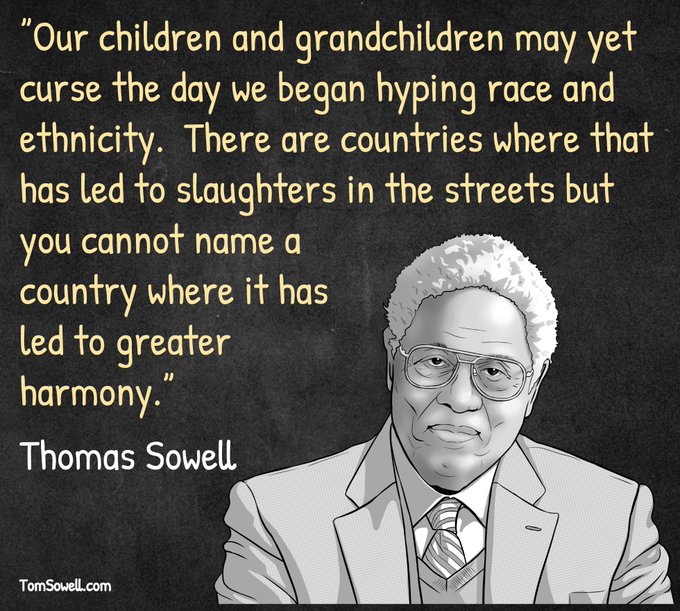Now why might black people in America think that, I wonder?
Because for at least a couple of decades, a small selection of disconnected academics have been invested in making money from instilling interracial hatred and distrust.
Saying that all white people are racist is as idiotic and divisive as saying all males are sexist. Are you a sexist by dint of you being male? Do you think all males are inherently sexist because they were born male in a society that has historically advantaged males, and that still uses the male body as the blueprint for everything? Do you even realize how pervasive it is? Females are injured in auto accidents at higher rates than males are because seatbelts are designed for an average male size; females are smaller and we end up with injured necks and broken collar bones because the shoulder strap doesn't cross our chest - it crosses our necks. Shelving is designed for the average male height, and despite the fact that females still do the majority of grocery shopping, we usually can't reach the top shelf. Straight backed chairs in restaurants and events are designed for average male proportions, which means that females frequently can't sit properly because our heels don't reach the ground. Even adjustable office chairs are designed to accommodate the normal standard deviation in male proportions, and are incredibly ill-suited to females on the lower end of the average FEMALE distribution.
Even knowing all of this - things that most males aren't even aware of, because it never inconveniences them - I still wouldn't say that all males are sexist. It's an incredibly insulting sentiment, and it does nothing at all to address those issues. All if does it make males feel bad (especially the ones who care the most) and create bad feelings between males and females.
Honestly, how many of you well-meaning, deeply caring and compassionate males would feel it moot to have your employer spend hours of your time telling you how males are bad and inherently sexist, and not leave feeling offended and put upon?
Hell, this is has been a problem, and we can see the effects of it in real time right now. "I'd choose the bear" and everything associated with that, the constant denigration of males as an entire group, the completely lopsided demand of so many young females that males have to simultaneously leave them alone and don't talk to them or look at them but also magically know when they want to be looked at and talked to. It's a trap - and a whole lot of young males have decided to stop playing the game altogether and have started to treat females like crap or just completely ignore them.
It's bad enough that there's a growing collection of females out on social media whose entire basis right now is to push back against this horrific behavior from other females, and to talk up the benefits of males as they are.
Yes, some sexism exists. Yes, there are a whole lot of institutional structures and practices that advantage and privilege males. Yes, there is a dramatically disproportionate rate of violence and sexual offending by males against females. All of that is true.
But it's also true that it's not all males, it's not even most males. It's a very few males, and it's leftovers from prior generations that haven't yet run their course and righted the ship.
I don't know how often I, as a female, get massive pushback from males - progressive social justice males hell-bent on equity - insisting that I have to use qualifiers for every-◊◊◊◊◊◊◊-thing and always say "not all males" or "some few males" etc. Because if I generalize, they take offense. Becuase they as individuals are NOT sexists or threats.
But those exact same males seem completely oblivious to the identical dynamic when the topic is race. When it's race, somehow it's perfectly fine to spread the sins of the few across everyone with the same skin color.
Why?


